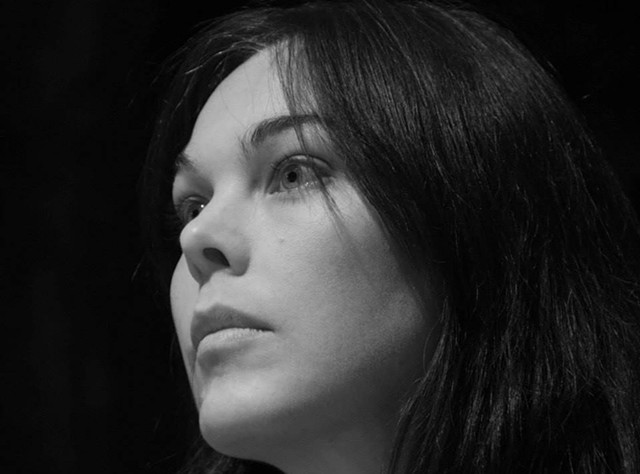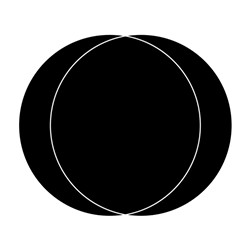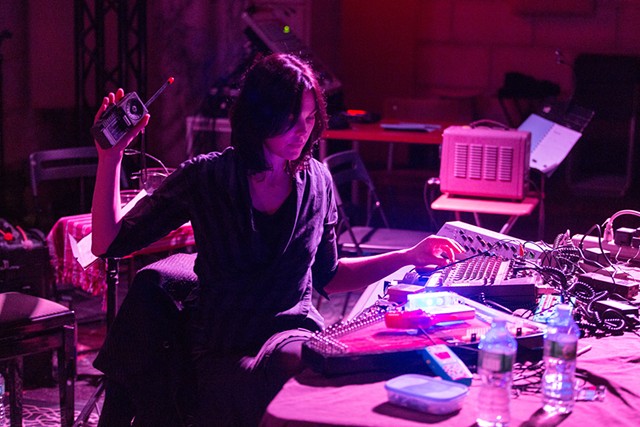
- Olivia Block
Olivia Block isn't crazy about performing live. Before she became a globally admired composer, she — like many people drawn to the mysterious realm of experimental music — began her musical life playing in rock bands. But, as she recently told her hometown altweekly, the Chicago Reader, being the focus of attention onstage never suited her.
"I was David Bowie, but I wanted to be Brian Eno," Block told the paper. "I wanted to be lurking in the corner, because the spotlight made me uncomfortable."
That might explain why there won't be a spotlight when she performs her 2015 album-length composition, Aberration of Light, at Champlain College this Friday, March 4. Actually, there won't be light of any kind.
As the show begins, the audience will be plunged into complete darkness. Block will be in a corner, mixing the record live to four speakers placed strategically throughout the room.
In a recent phone call with Seven Days, the musician explains that, in a live setting, Aberration works almost like sensory deprivation. When audiences are in the dark, they're forced to experience the composition with other senses.
"The piece is really immersive," says Block. "A lot of it is really low; it rumbles through your body and moves very slowly. It's a very visceral piece."
She thinks of Aberration as "a movie that has no images." That makes sense, since the piece was originally conceived as a soundtrack to a film made by two visual artists. But Block soon began working on the composition independently.
"I started thinking about this idea of cinema without visuals, just sound in cinema," she explains. "I really like the idea of being in a dark room and facing forward like you're looking at a screen, but you're just listening.
"One of the first spaces for an immersive sound-art experience was in movie theaters," she adds. "So I'm trying to call attention to that, in a way."
Might Block's composition be seen as the inverse of a silent film?
"That's exactly what it is," she concurs. "In fact, there's a movement called 'cinema for the ears.' It's the idea that what makes watching a film so powerful is the sound, not just the images."

- Aberration of Light album cover
Aberration begins quietly, almost soundlessly, with faint noises that tickle the ear in much the same way a mosquito might — you instinctively know it's there, even if you can't hear the hum. Over half an hour, the piece ebbs and flows cyclically, with delicately woven electroacoustic elements that swirl like drifting snow on a bed of white noise.
Block is known for integrating field recordings into more conventional works and for using conventional instruments in compositions dominated by found sounds. Here, clarinet and bass clarinet can be heard slithering through waves of static. They prove comforting in their familiarity amid the wash of alien sounds — particularly at those ominous moments when volume spikes to near panic-inducing levels.
"Aberration of Light had a very interesting quality to us," says Toby Aronson, whose Burlington-based label, NNA Tapes, released the composition on cassette last year. "It starts out almost with no sound at all, and then emerges as if someone is slowly turning the blinds on a blistering sunny day."
Given the transcendental qualities of Block's composition, it's no wonder that Aronson turns to poetic metaphors to describe it.
"The piece is very abstract but has such an organic and almost emotional quality to it," he opines. "It sounds like the sea, at times roaring, with melody enclosed and developing so slowly, almost like a flower slowly opening."
Block is coming to Burlington as part of the Signals series, a semester-long program of concerts curated by local experimental composer Greg Davis in conjunction with Champlain College. She is the second artist to appear during the spring semester. The first was Montréal-based noise duo Le Révélateur. In the series' debut run last fall, artists included psychoacoustic composer Ben Vida, electroacoustic composer Jefre Cantu-Ledesma, and Davis himself.
Even amid that range of abstruse sounds, Block stands out. Davis says that's a credit to her artistic curiosity, and to her willingness to prod beyond the shadowy boundaries of contemporary experimental music.
"What I find most interesting about Olivia's music is that she floats freely in the spaces between being a recording artist, composer, sound artist, electroacoustic improviser and teacher and [doing] installation work," says Davis. "I think this has allowed to her to move around in different spheres and scenes of the experimental music world and not be tied down to one style or approach or system."

- Olivia Block performing
Indeed, Block embraces all manner of composition and noisemaking, which is reflected in her voluminous résumé. Though she flirted with classical training at a New England music school, she describes herself as "mostly self-taught." She's exhibited her work all over the United States, Europe and Japan. She's composed soundtracks to films. She composes for orchestral and chamber groups. She's lectured at prestigious universities, including Yale and the University of Chicago.
Currently, Block is working on a large sound installation that will premiere at the Chicago Architecture Biennial in 2017. Previously, she's done installations at the Museum of Contemporary Art Chicago and Wesleyan University, and at an exhibit for the 2006 Winter Olympics in Turin, Italy.
For all her varied musical interests, Block's hallmark is most likely her fascination with found sounds, which seems to find a place in her art regardless of medium. She carries a recorder with her at all times, a habit she developed more than a decade ago while living in Texas. Found sound and sound collage have become something of a trend in recent years, but Block deploys her array of captured ambient noises more creatively and purposefully than most. To her, the rattle of a passing subway car, a muffled conversation or the ticking of a crossing signal is simply another instrument to be arranged, like a violin or a trumpet.
"I feel like I'm doing it right when the found sounds seem like instruments, and the instruments almost sound like noises," she says.
"Lots of sound artists find urban sounds of trains thumping against wooden boards 'interesting,'" says Aronson. "But what's striking is that Olivia seems to find a peaceful beauty in the sounds of urban life, industrialization and our technologically influenced modern world.
"She uses a very interesting blend of things she's recorded on tape, acoustic instruments, computer processing and effecting of the raw sound source," Aronson continues. "Her music is very gentle at times, slow moving and delicate, but also roaring, intense and overwhelming."
And it's best experienced in the dark.









Comments
Comments are closed.
From 2014-2020, Seven Days allowed readers to comment on all stories posted on our website. While we've appreciated the suggestions and insights, right now Seven Days is prioritizing our core mission — producing high-quality, responsible local journalism — over moderating online debates between readers.
To criticize, correct or praise our reporting, please send us a letter to the editor or send us a tip. We’ll check it out and report the results.
Online comments may return when we have better tech tools for managing them. Thanks for reading.